- Clone
- 15F9 (See other available formats)
- Regulatory Status
- RUO
- Other Names
- Inducible COStimulatory molecule, H4, CD278
- Isotype
- Syrian Hamster IgG
- Ave. Rating
- Submit a Review
- Product Citations
- publications
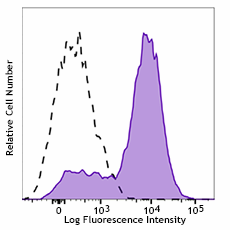
-

C57BL/6 mouse splenocytes were cultured with ConA/IL-2 for three days. Cell were stained with anti-mouse CD278 (ICOS) APC (clone 15F9; filled histogram) or Syrian hamster IgG isotype control APC (open histogram).
| Cat # | Size | Price | Quantity Check Availability | Save | ||
|---|---|---|---|---|---|---|
| 107711 | 25 µg | $102 | ||||
| 107712 | 100 µg | $261 | ||||
CD278 is a 47-57 kD protein, also known as inducible costimulatory molecule (ICOS), or H4. This protein is homologous to the CD28/CTLA-4 proteins. It forms homodimers and is expressed on activated T cells and a subset of thymocytes. It is able to costimulate T cells proliferation. In addition, ICOS has been shown to be involved in humoral immune responses (B cell germinal center formation). The ICOS ligand is B7-H2. ICOS stimulation has been shown to potentiate TCR-mediated IL-4 and IL-10 production and has been proposed to play a role in Th2 cell development. It has also been shown to be involved in airway tolerance and the downregulation of pulmonary inflammation.
Product DetailsProduct Details
- Verified Reactivity
- Mouse
- Antibody Type
- Monoclonal
- Host Species
- Syrian Hamster
- Formulation
- Phosphate-buffered solution, pH 7.2, containing 0.09% sodium azide.
- Preparation
- The antibody was purified by affinity chromatography and conjugated with APC under optimal conditions.
- Concentration
- 0.2 mg/ml
- Storage & Handling
- The antibody solution should be stored undiluted between 2°C and 8°C, and protected from prolonged exposure to light. Do not freeze.
- Application
-
FC - Quality tested
- Recommended Usage
-
Each lot of this antibody is quality control tested by immunofluorescent staining with flow cytometric analysis. For flow cytometric staining, the suggested use of this reagent is ≤0.25 µg per million cells in 100 µl volume. It is recommended that the reagent be titrated for optimal performance for each application.
- Excitation Laser
-
Red Laser (633 nm)
- Application Notes
-
Additional reported applications (for the relevant formats) include: immunohistochemical staining2 of acetone-fixed frozen sections.
-
Application References
(PubMed link indicates BioLegend citation) -
- Dong C, et al. 2001. Nature 409(6816):97.
- Walker LSK, et al. 2003. J. Immunol. 170:91.
- Product Citations
-
- RRID
-
AB_2728128 (BioLegend Cat. No. 107711)
AB_2728129 (BioLegend Cat. No. 107712)
- Disclaimer
-
This product may be used for research purposes only. It is not licensed for resale and may only be used by the buyer. This product may not be used and is not licensed for clinical assays where the results of such assays are provided as a diagnostic service. If a diagnostic or therapeutic use is anticipated then a license must be requested from the University of California. The availability of such diagnostic and therapeutic use license(s) cannot be guaranteed from the University of California.
Antigen Details
- Structure
- CD28/CTLA-4, 47-57kD
- Distribution
-
Activated T cells, subset of thymocytes
- Function
- Costimulates T cell activation, proliferation, humoral immune response
- Ligand/Receptor
- B7h/B7RP-1/GL-50
- Cell Type
- T cells, Thymocytes, Tregs
- Biology Area
- Costimulatory Molecules, Immunology
- Molecular Family
- CD Molecules
- Antigen References
-
- Rudd CE, et al. 2003. Nat. Rev. Immunol. 3:544.
- McAdam AJ, et al. 2000. J. Immunol. 165:5035.
- Mak TW, et al. 2003. Nat. Immunol. 4:765
- Gene ID
- 54167 View all products for this Gene ID
- Specificity (DOES NOT SHOW ON TDS):
- CD278
- Specificity Alt (DOES NOT SHOW ON TDS):
- CD278
- App Abbreviation (DOES NOT SHOW ON TDS):
- FC
- UniProt
- View information about CD278 on UniProt.org
Related FAQs
Other Formats
View All CD278 Reagents Request Custom Conjugation| Description | Clone | Applications |
|---|---|---|
| PE anti-mouse CD278 (ICOS) | 15F9 | FC |
| PE/Cyanine5 anti-mouse CD278 (ICOS) | 15F9 | FC |
| APC anti-mouse CD278 (ICOS) | 15F9 | FC |
| PE/Fire™ 640 anti-mouse CD278 (ICOS) | 15F9 | FC |
| PE/Fire™ 700 anti-mouse CD278 (ICOS) | 15F9 | FC |
Customers Also Purchased
Compare Data Across All Formats
This data display is provided for general comparisons between formats.
Your actual data may vary due to variations in samples, target cells, instruments and their settings, staining conditions, and other factors.
If you need assistance with selecting the best format contact our expert technical support team.
-
PE anti-mouse CD278 (ICOS)
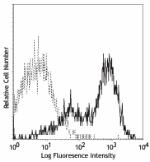
Con A-stimulated (3 days) BALB/c splenocytes stained with 15... -
PE/Cyanine5 anti-mouse CD278 (ICOS)
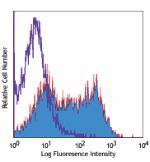
ConA-stimulated C57BL/6 mouse splenocytes stained with 15F9 ... -
APC anti-mouse CD278 (ICOS)
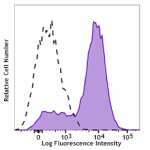
C57BL/6 mouse splenocytes were cultured with ConA/IL-2 for t... -
PE/Fire™ 640 anti-mouse CD278 (ICOS)
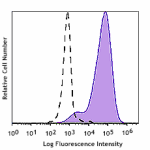
C57BL/6 mouse splenocytes were cultured with ConA/IL-2 for t... -
PE/Fire™ 700 anti-mouse CD278 (ICOS)
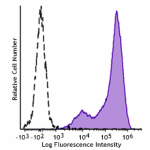
C57BL/6 mouse splenocytes were cultured with ConA/IL-2 for t...
 Login/Register
Login/Register 










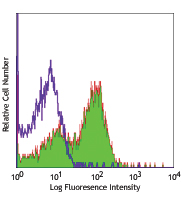
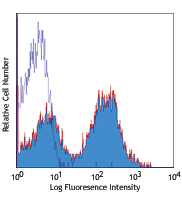
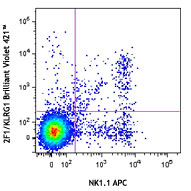
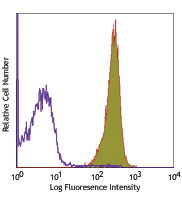



Follow Us